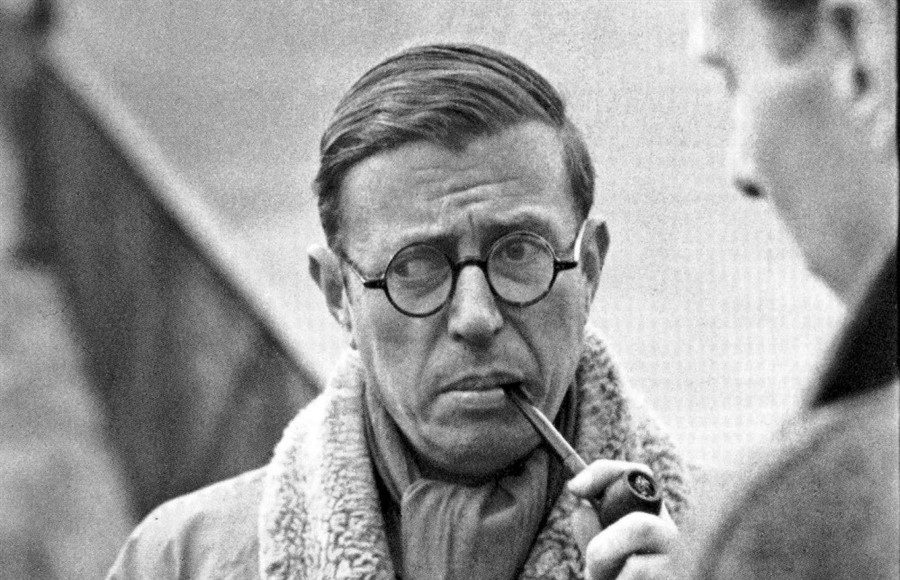The relationship between I and the Other, or rather its tension, was carried over to existential philosophy and came up to Levinas.
In fact, the subject’s self-centered view of the world in modern philosophy begins with Aziz, the first great thinker of Christianity. Born to a pagan father and a deeply Catholic mother, the philosopher is a relentless truth-seeker. At the age of 28, while deeply contemplating in the garden of his house, a child opens the Bible with his voice saying, ‘Take it, take it,’ and sees the verse he reads as a warning and goes in the way of God. The verse he recites is, “Go and sell what you have, and give it to the poor, and the treasure in the heavens will be yours. Come on, follow me.”
Until that day, he tried to find his way through teachings such as Maniism, Cicero, Platon and Skepticism, but none of them satisfied him. With the birth of faith on that day, he will devote himself entirely to God in the path of Christianity.
Augustinus introduced medieval Christian philosophy to the service of theology with the words “Credo mulberry intelligam”, that is, “I believe to understand!” Again, according to him, although God has the characteristic of love, the path to God passes through us. We go to God from the inside, God comes to us from the inside. We can know it with our soul.
He will say to his Lord, “What do you mean to me, lord, say with all your forgiveness, Lord. Tell my soul, “I am your salvation!” I’m going to run after that voice and I’m going to find you. “This is the first time that the first individual has been promoted to the representation of truth.
Augustinus is a groundbreaking figure not only in philosophy but also in Western Literature with his work “Confessions”. Augustinus started the tradition of confession of sins in his work “Confessions”. The work is the repentance of a sinner from start to finish. This tradition, which he initiated, later occupies a very important place in the tradition of Western Literature and philosophy as a confession of internal reckonings. The tradition of the construction of the first singular person as the carrier power of truths and the confession of their quests and turmoil in the inner world of the individual extended from here to pascal, Nietzsche, Sarter, Kierkegaard, representatives of existential philosophy.
According to Augustinus, confession is an expression of a quest, a search for truth, and also the need for a sinful person to beg God for forgiveness. Augustinus, who wishes to win the love of God and forgive his sins, pleads with Him in chapter 5 of Book 1 of Confessions:
“Who’s going to make me feel at peace with you? Who will bring you to my heart, who will make me love this heart and make me forget the evil I have done, and make me embrace you as my only good? What do you mean to me? Have mercy so I can talk. What am I to you that you’re telling me to love you, who am I that if I don’t love you, you’re mad at me and threatening to put me in great pain?! If I don’t love you anyway, is that a little pain? Woe to me!”
Again, augustinus, in his de Civitate Dei (City of God), we see that God guided the universe and human communities according to a certain purpose, that the world stage was the scene of the battle between good and evil, and that by stating that God would be the ultimate victory, he laid the foundations of the progressive understanding of western history, especially inspired by Hegel’s idea that ‘Absolute Good’ opens itself up in history. Thus, When Hegel said that the center of ‘Absolute Tin’ was in Europe as of the time it lived, he formed the mental background of the activity of dominating Europe over the other and shaping the other in its own way.
The spiritual transformations of Infinity, expressed by Hegel’s faith-filled optimism, have historically been manifested by the destruction of the material riches and cultural backgrounds of ‘outdated’ societies.
Existentialism; It is the common name of philosophy opinions that say that human beings do not have a defined essence before them and that existence comes before them, interacts with and interacts with their environment, and that their existence gains effectiveness as a result of the choices they make with the possibilities that come before them, and that it realizes itself within this activity.
Jean Paul Sartre is the most important representative of this movement, which gained prevalence during the two world wars, especially after the 1930s.
Existentialism, as Sartre puts it:
“If we want to describe it in terms of philosophy, we can say that every object has an existence and an essence. The essence is an immutable whole of an object’s properties. Existence is the fact that it is found in the universe. Many people believe that the essence comes first, after existence; this idea comes from religious thought; Really, someone who wants to build a house needs to know what kind of house to build. It precends self-existence here.
Those who believe that God created man like this, think like this, and conclude that God will do this by looking at the ideas he has before. Those who do not believe in God cannot get rid of the same effect, suggesting that an object can only exist if it is appropriated with its own ideas.” 1
The whole 18th century believed in the existence of an essence called human nature, which is common in everyone. According to existentialism, existence in man (and only man) precedas self. This basically means that; First there are people, one way or another, then it comes later.”
For this reason, an ideology of humanism has emerged that idolizes man as God. Although this means destroying the world and nature, it is the root of the concept that “everything that people do is acceptable”. Also, some people are considered more human than others, so they have more power to do what they want. As George Orwell said at the Animal Farm: “All animals are equal, but some animals are more equal than others.”
The existentialism movement is divided into two parts: god-given, atheist existentialism, and religious/Christian existentialism. The representative of atheist existentialism is Jean Paul Sartre, and christian existentialism is Soren Kierkegaard. According to this philosophical current, man is a whole that can be understood by the choices he makes in the possibilities and historical and social conditions.
Life was lost among the rising mountains of arrogance, where the world was a complete minefield, the honor of being human was disregarded. God’s absolute existence became obscure, increasingly invisible. Was this a pre-cost to the good, or was it a punishment for the accumulated sins?
The philosophy of existence is like a lament to uncertainty and absurdity at a time when the world has become a minefield after all destruction, vulgarity, brutality and loss, and human dignity has been lost with all its meanings. As a result of the Second World War, people lived in a senselessness left behind by the blowing up of mountains of arrogance. They breathed into the uncertainty of God’s absolute existence, which became increasingly invisible. Was this destruction a price paid for future prosperity or for the accumulated sins of mankind?
1- Jean-Paul, Sartre. “Existentialism is a Humanism.” (1996).





